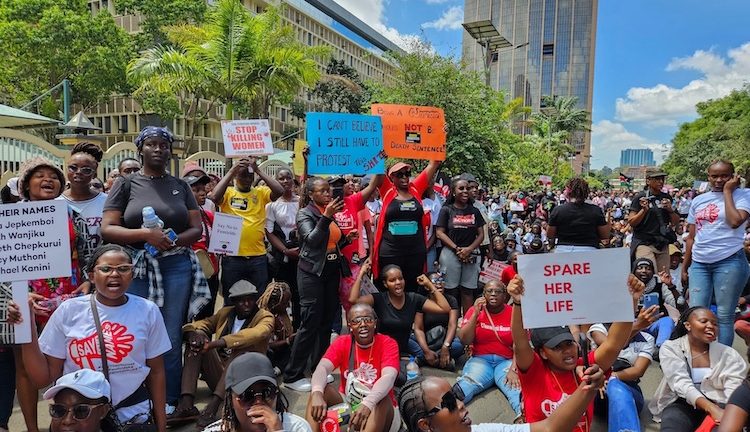By Lisa Vives, Global Information Network
NEW YORK | 22 February 2024 (IDN) — Hundreds of women dressed in black gathered in Kenya’s capital at a vigil dubbed “Dark Valentine” to protest the rise in femicides in the country.
More than 16 cases were reported by police and local media since the start of the year.
“We are losing so many women, so many girls,” said Merlin Kawira, a student and founder of an on-campus mental health support group called Africa Arts and Mental Talks. “So today, most of us have come here to ensure that we end femicide.”
On a day traditional for celebrating love, students gathered to remember the victims of femicide by lighting candles, chanting the names of those killed and holding red roses.
The Valentine’s Day protest comes on the heels of a march last month when thousands took to the streets calling for an end to the scourge and for Kenya’s notoriously backlogged justice system to deal seriously with domestic violence.
Grace Wangari, age 24, is one of 16 Kenyan women who died allegedly at the hands of their partners since the start of 2024. Last month,26-year-old Starlet Wahu was stabbed to death by a man alleged to be part of an extortionist criminal ring that targets women through dating sites.
Less than two weeks later, another woman was drugged and dismembered by a man she had arranged to meet in a rented flat, with her body discarded in plastic bags.
This week’s vigils are expected to be the country’s largest commemoration yet of the victims of gender-based violence.
“The reality of any woman living in this country [is] you always live under the banner of fear because we’ve grown up with this. “It’s historical to say it’s a recent spark that has sent people over the edge,” said Muthoni Maingi, one of the conveners of the nationwide protests.
Hashtags like #WeAreNotSafe, #StopKillingWomen and #EndFemicideKE are trending in Kenya.
They reflect an intense national debate over a series of murders that have rocked the country. In January, 30 women were murdered, according to data compiled by the grassroots organization Usikimye (Swahili for “don’t be silent”), whose mission is to end gender-based violence, working with other feminist and human rights groups.
The Kenya Police Service does not track murders by gender.
Under criticism
President William Ruto has come under criticism for not personally addressing femicide. But following the protests, his government vowed to expedite investigations and introduced a toll-free number for the public to report perpetrators.
In Kenya and across Africa, campaigners say more investigators need to be hired, judges need to decide cases more quickly and legislatures should pass laws to punish perpetrators more severely.
Data collection and research on femicide need to be funded, said Patricia Andago, a researcher at the data firm Odipo Dev.
Amnesty International Kenya Executive Director Irungu Houghton urged the President to speak out against femicide, given his position as the highest authority in the republic.
“Such a statement would convey a powerful message to the entire nation, signaling from the highest echelon of the republic that this (femicide) is unequivocally unacceptable,” he said on Citizen TV.
Highlighting the gender disparity revealed in the latest report from the Gender Equality Commission, Irungu pointed out that Kenya is still a considerable distance away from achieving true gender equality.
He identified challenges such as disinformation, online attacks on women, and hate crimes as formidable obstacles hindering progress in this regard.
Systematic domestic violence
For now, the killings continue to leave a trail of devastation.
Grace Wangari’s mother said she was haunted by recent discoveries about her daughter’s life. She recalls with sadness how she had promised to send her money to move to a new apartment. Wangari had two daughters, who now live with Susan Wairimu. Watching her granddaughters play, Wairimu wonders if things could have played out differently.
At least 500 femicide cases have been recorded in Kenya since 2016. A majority of the killings follow systematic domestic violence, according to the platform Africa data hub which says femicide cases are probably under-reported and miscategorized due to inadequate coverage.
Says Maingi: “We are holding the vigils to remind the country that in [what are supposed to be] circumstances of safety and love, a lot of women meet their demise.” [IDN-InDepthNews]
Photo: Women protesting femicide in Kenya. Credit: NPR
IDN is the flagship agency of the Non-profit International Press Syndicate.


